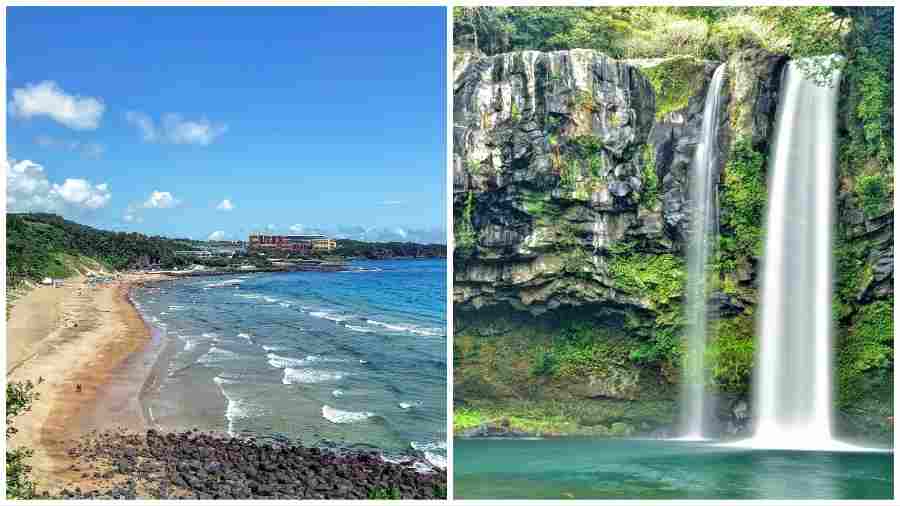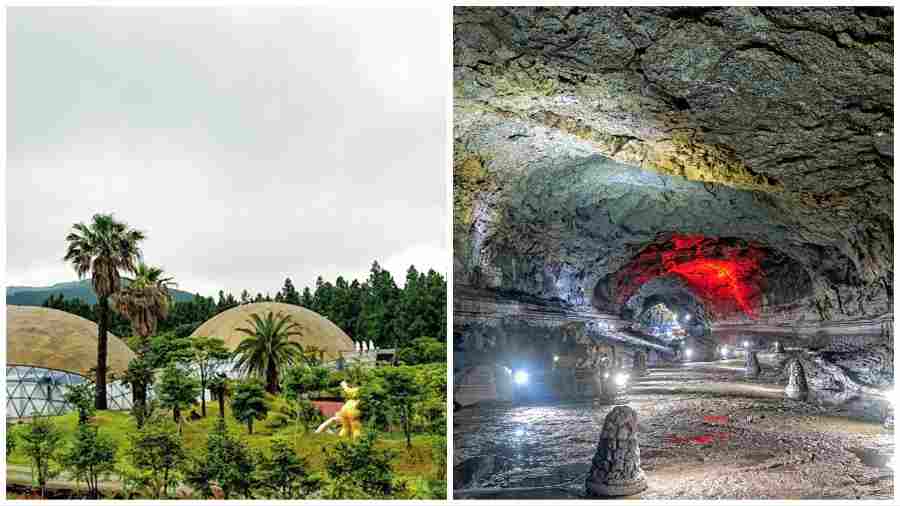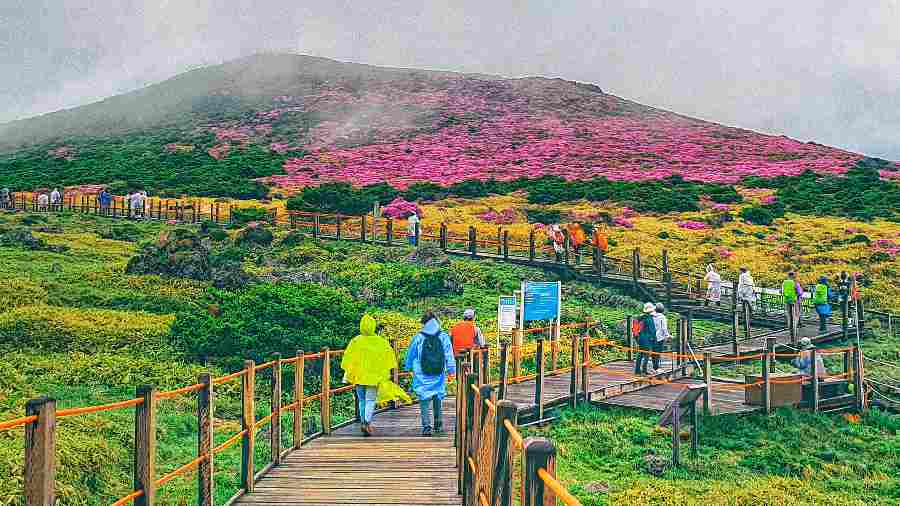If you are a die-hard fan of Korean boy band BTS’ golden maknae Jeon Jungkook, you would already know that he has said that the South Korean volcanic island of Jeju is his favourite travel destination and rumours that he had visited Jeju Island with his fiancée earlier this year have barely subsided.
Jungkook was doing a seductive photo shoot with American fashion label Calvin Klein that left the BTS Army thirsting for more when he was asked where he wanted to travel next. The 25-year-old celebrity answered right away: “I haven’t travelled much, but I like Jeju Island.” This added grist to the rumour mill, which had already been which had been rife with speculation from January 5, when there was a post that said “Jungkook was spotted dating on Jeju Island”.
The island is also believed to be the location of another BTS member Taehyung and Blackpink’s Jennie’s date last year. A picture of Jungkook dining with an unidentified woman who, the poster claimed, was his girlfriend, has set the Internet ablaze.
South Korea provides visitors with a distinctive experience of its unique culture, language, and customs. And there are lots of opportunities to learn about Korean history and lifestyle from varied places ranging from historic palaces and temples, to bustling markets and shopping streets.
Jeju Island is a good addition to those, more so since it is also on Jungkook’s list. Here is a quick guide to the most delightful places that one must visit on the “island of the gods”.

The picture of Jeon Jungkook with an unidentified woman that put Jeju Island in South Korea on the global tourist map.
Hallasan National Park
The park is named after South Korea’s highest summit, Hallasan Mountain, which has a peak elevation of 1,950m. Hikers and outdoor enthusiasts enjoy visiting Hallasan National Park. With picturesque views of the island’s forests, streams and waterfalls, the park provides a choice of hiking paths that range from simple to difficult.
The Teddy Bear Museum
This a well-known museum on Jeju Island that focuses on the evolution and traditions of the teddy bear. It is a must-see tourist destination on the island, particularly for families with young children. Around 14,000 teddy bears from all over the world are on display, including several that are costumed in traditional Korean garb. The evolution of the teddy bear over time, as well as its cultural relevance in other nations, are all topics that visitors can learn about.

(L-R) Jungmun Beach, Cheonjeyeon Falls
Jungmun Beach
The stunning sandy beach and crystal clear waters at Jungmun Beach are one of Jeju Jungmun Resort’s key draws. Swimming, surfing, and sunbathing are all excellent there. The Yeomiji Botanical Garden, the Teddy Bear Museum, and the Cheonjeyeon Waterfall are just a few of the several additional attractions in the vicinity.
Seongsan Ilchulbong Peak
The summit is well-known for its distinctive shape and stunning panoramas of the surroundings. Hiking up to the peak will reward visitors with breathtaking views of the ocean and the rocky shoreline of the island. The sunrise, which is a well-known tourist attraction, may be seen best early in the morning by hiking up the peak.
Cheonjeyeon Waterfall
At Jeju Island, Cheonjeyeon Waterfall is a well-liked tourist destination. The three-tiered waterfall that empties into a pond at the bottom is known as “Cheonjeyeon” in Korean, which translates to “Pond of God.” The waterfall is a lovely location for nature enthusiasts as it is encircled by rich vegetation. The area’s picturesque beauty can be admired by visitors while they stroll along the well-kept trails that lead to the waterfall.

(L-R) Jeju Lovelan, Manjanggul Cave
Osulloc Tea Museum
One of Korea’s top tea firms, runs the museum, which is devoted to the history and culture of Korean tea. The relevance of tea to Korean culture is displayed in the museum. Visitors can learn about the various kinds of tea grown and eaten in Korea as well as the cultivation, harvesting, and processing processes involved.
Jeju Loveland
This is a sculpture park with an adult theme. Couples and adults seeking a different and enjoyable experience frequently visit this attraction. Intimacy, love and sexuality are just a few of the many sexual themes that are depicted throughout the park’s more than 140 sculptures and works of art. The sculptures are composed of various materials, such as metal, stone and wood, and are the work of Korean artists.
Jeju Jungmun Resort
The southern coast of Jeju Island, South Korea, is home to the opulent Jeju Jungmun Resort. With a total area of over 2 million sq m, it is one of the biggest resorts in Asia. The resort features numerous hotels, golf courses, a water park, and a convention centre, as well as a variety of food and retail opportunities. Also, there are several cultural sites close by, including the Jeju Teddy Bear Museum and the Jeju Folk Village Museum.
Manjanggul Cave
With a total length of about 7.4km, it is one of the world’s longest lava tube caves. Around 200,000 years ago, lava solidified and cooled, creating the cave. Lava stalactites and lava flow lines are only a couple of the unusual geological structures that may be seen there.
Jeju Folk Village
The village offers tourists a look into the island’s rich history and culture by showcasing traditional Jeju Island homes and cultural relics. You can explore the hamlet on foot while taking in traditional performances, donning traditional attire, and even taking part in cultural pursuits like making soy sauce and dyeing linen. Other natural history displays, such as geological formations and indigenous flora and wildlife, are also available at the museum. Popular tourist destination Jeju Folk Village provides guests of all ages with an engaging and instructive experience.
